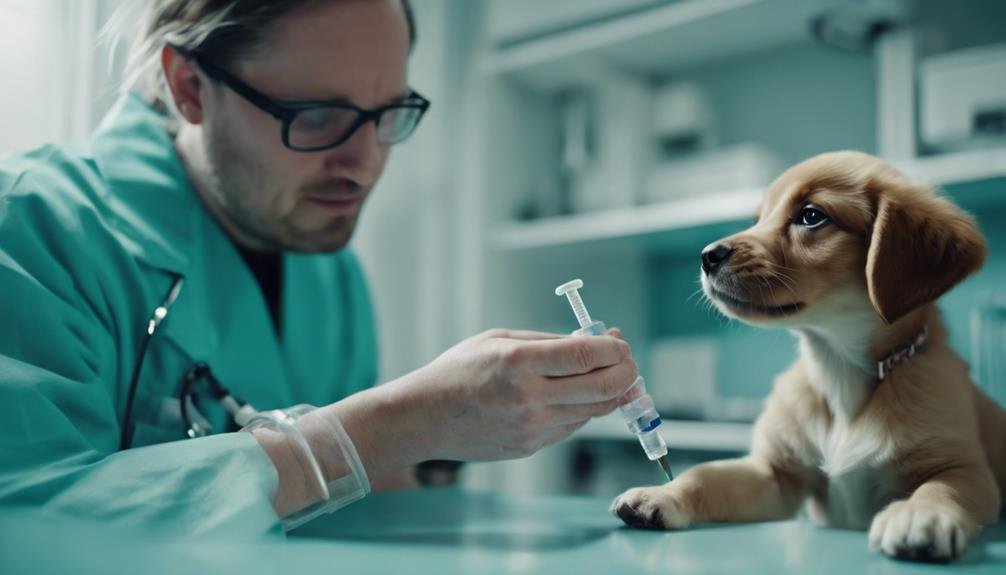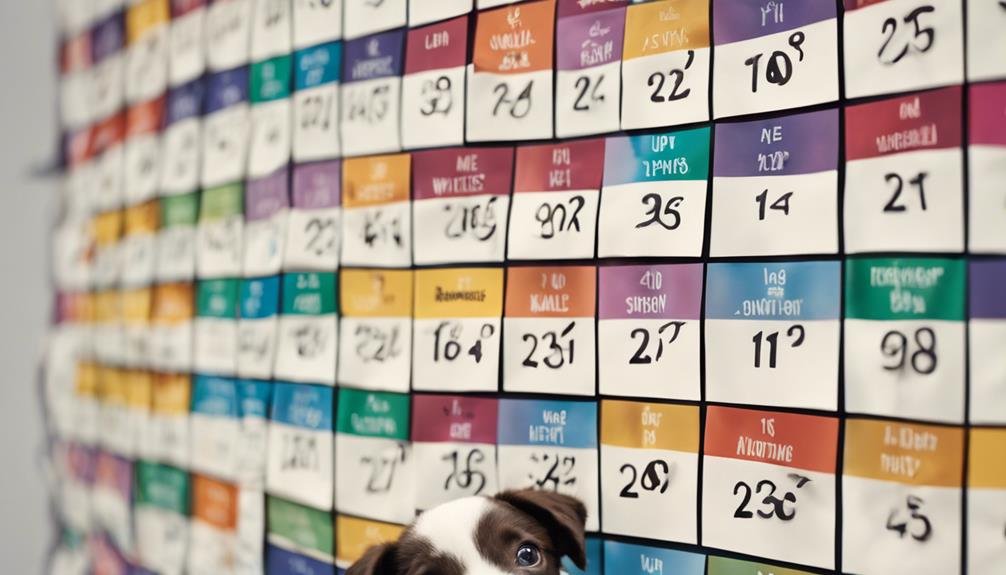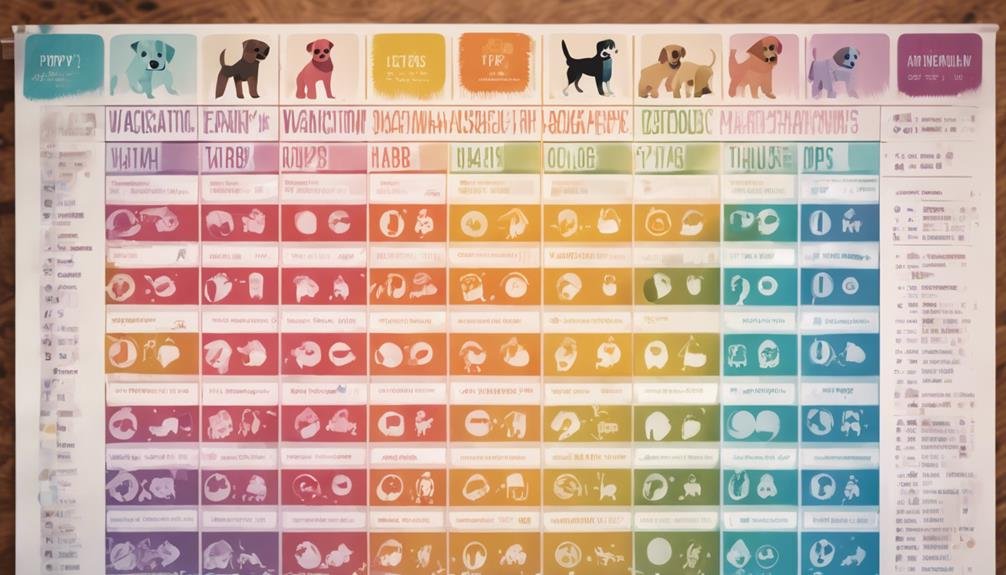Understanding the intricacies of a first-year puppy vaccination schedule is a cornerstone of responsible pet ownership. From the initial immunizations at 6-8 weeks to the crucial booster shots at 10-12 weeks, each step plays a vital role in safeguarding your furry friend's health.
But what are the common vaccines required, and how do you navigate potential reactions? Delving into the nuances of this vaccination chart not only ensures your puppy's well-being but also contributes to the broader community's health.
Stay informed, and pave the way for a healthier future for your canine companion.
Key Takeaways
- Initial vaccinations at 6-8, boosters at 10-12, and additional shots at 14-16 weeks for comprehensive protection.
- Annual vaccinations necessary for sustained immunity against common puppy diseases.
- Consult with a vet for a personalized vaccination plan tailored to your puppy's needs.
- Timely vaccinations crucial to establish strong immunity and protect your puppy's health.
Importance of Puppy Vaccinations
Vaccinating puppies is crucial to bolster their immune system and safeguard them against a spectrum of diseases. By administering vaccines, puppies develop immunity to potentially life-threatening illnesses, ensuring their well-being and longevity.
These vaccinations not only protect the individual puppy but also contribute to the broader community by preventing the spread of contagious diseases. Additionally, many regions require up-to-date vaccinations for pet licensing, emphasizing the importance of this preventive measure.
Regular vaccinations are a fundamental aspect of responsible pet ownership, as they play a significant role in maintaining the health and happiness of puppies. Consulting with a veterinarian to establish a tailored vaccination schedule is essential in providing puppies with the necessary protection against common canine diseases.
Common Puppy Vaccines
To ensure comprehensive protection for puppies, understanding the essential common vaccines in their first-year vaccination schedule is imperative. The following common puppy vaccines are crucial for safeguarding your pet's health:
- Distemper
- Parvovirus
- Adenovirus
These vaccines protect against potentially life-threatening diseases that puppies are susceptible to. Distemper affects the respiratory, gastrointestinal, and nervous systems; parvovirus causes severe gastrointestinal illness, and adenovirus targets the liver and respiratory system. By ensuring your puppy receives these vaccinations at the appropriate times, you significantly reduce the risk of them contracting these dangerous illnesses.
Always consult with your veterinarian to establish a suitable vaccination schedule for your puppy's specific needs.
Puppy Vaccination Schedule Overview

A structured and timely vaccination schedule is essential for ensuring the optimal health and immunity of your puppy. Starting at 6-8 weeks of age, the initial vaccines for common diseases like distemper, parvovirus, adenovirus, parainfluenza, and rabies are administered.
Boosters are typically given at 10-12 weeks, followed by additional shots at 14-16 weeks to reinforce immunity. After the initial series, annual vaccinations are necessary to maintain protection.
It is crucial to consult with a veterinarian to create a personalized vaccination plan tailored to your puppy's specific needs and risk factors. By adhering to a comprehensive vaccination schedule, you can help safeguard your puppy against potentially life-threatening illnesses and ensure a healthy start to their life.
Starting Vaccinations: 6-8 Weeks
Commencing the immunization process for a puppy at 6-8 weeks of age marks the crucial beginning of their vaccination journey towards robust immunity and protection against various diseases. During this initial stage of vaccinations, it is important to follow a structured approach to ensure the puppy's health and well-being.
Here are three key points to consider:
- Schedule an appointment with a veterinarian specializing in puppy care to discuss the vaccination plan.
- Begin with essential vaccines like distemper, parvovirus, and adenovirus to provide primary protection.
- Monitor the puppy for any signs of adverse reactions post-vaccination, such as mild fever or lethargy, and consult the vet if concerns arise.
Booster Shots: 10-12 Weeks

At 10-12 weeks, puppies are due for booster shots to further strengthen their immunity against key diseases. These booster shots are crucial in reinforcing the initial vaccinations given at 6-8 weeks.
The vaccinations typically administered during this stage include boosters for distemper, parvovirus, adenovirus, parainfluenza, and sometimes rabies, depending on the initial vaccination schedule. These booster shots help ensure that the puppy's immune system is robust enough to combat potential threats from these diseases.
It is important to adhere to this schedule to provide optimal protection for your puppy during this critical stage of development. Consult with your veterinarian to ensure your puppy receives the necessary booster shots at the right time.
Follow-Up Shots: 14-16 Weeks
The vaccination schedule for puppies includes follow-up shots typically administered at 14-16 weeks to reinforce their immunity against key diseases. These follow-up vaccinations are crucial in providing continued protection for your puppy as their initial immunity from earlier shots may start to wane.
It is important to stay on schedule with these follow-up shots to ensure your puppy's immune system is fully prepared to combat potential threats.
- Schedule the follow-up shots in advance to avoid missing the critical window.
- Monitor your puppy for any unusual symptoms or behaviors post-vaccination.
- Consult with your veterinarian if you have any concerns or questions regarding the follow-up shots.
Annual Vaccinations Guidance

Annually, maintaining a consistent schedule for your puppy's vaccinations is vital to ensure long-term protection against various diseases.
Annual vaccinations are crucial as they help boost your puppy's immunity and strengthen their defenses against common illnesses like distemper, parvovirus, adenovirus, parainfluenza, and rabies.
By staying up to date with these vaccinations, you not only protect your puppy but also contribute to the overall community's health by preventing the spread of contagious diseases.
It is recommended to consult with your veterinarian to establish a personalized vaccination plan tailored to your puppy's specific needs and lifestyle.
Signs of Vaccination Reaction
Early recognition of potential signs of vaccination reaction in puppies is crucial for prompt intervention and ensuring their well-being. It is essential for puppy owners to monitor their pets closely after vaccination to identify any adverse reactions.
Some common signs of vaccination reaction in puppies include:
- Mild fever
- Lethargy
- Loss of appetite
These symptoms may occur shortly after vaccination and usually resolve on their own. However, if more severe reactions such as swelling at the injection site or persistent symptoms are observed, it is important to seek immediate veterinary care.
While severe reactions are rare, being vigilant and responsive to any signs of vaccination reaction can help ensure the health and safety of your puppy.
Additional Puppy Care Tips

For optimal well-being and development of your puppy, implementing additional care tips beyond vaccinations is essential. These tips not only contribute to your puppy's physical health but also aid in their mental and emotional well-being. Below is a table summarizing key additional care tips to consider for your puppy:
| Additional Puppy Care Tips | |
|---|---|
| Regular vet check-ups | Proper nutrition |
| Socialization | Training |
| Exercise for physical and mental health |
Consultation With Veterinarian
When considering the health and well-being of your puppy, it is imperative to schedule a consultation with a qualified veterinarian to discuss their overall care and vaccination needs. During this consultation, the veterinarian will provide essential information tailored to your puppy's specific requirements, ensuring they receive the necessary vaccinations and care to thrive.
Here are three key aspects to focus on during your consultation:
- Discuss the recommended vaccination schedule based on your puppy's age and health status.
- Inquire about potential side effects of vaccinations and how to monitor your puppy post-vaccination.
- Seek guidance on preventive measures against common puppy health issues and how to address any concerns promptly.
Conclusion
In conclusion, adherence to a structured first-year puppy vaccination schedule is vital for safeguarding the health and well-being of our canine companions.
By understanding the importance of timely vaccinations, recognizing common vaccines, and monitoring for potential reactions, pet owners can ensure their puppies are protected from a range of diseases.
Consulting with a veterinarian and following recommended vaccination guidelines are essential steps in promoting the longevity and vitality of our beloved pets.




